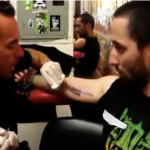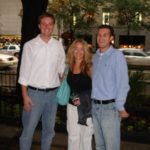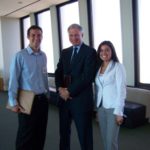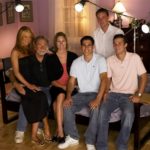From a young age Mary Gilbaugh knew she wanted to work in professional sports, but her corporate accounting career path took a few bends before her childhood dream would be realized. After running track for two years at USC, Mary confidently entered the world of corporate accounting only to realize the fifteen hour days were not for her. On November 11th, 2004 Mary’s longtime friend, USMC 2nd Lt. JP Blecksmith, was killed in Fallujah, Iraq.
 Allowed a leave of absence, Mary took the opportunity to co-found the JP Blecksmith Foundation which sponsors an annual memorial 5k in San Marino, California. After returning from the leave of absence, Mary took another corporate job, always alert however, to other opportunities in her field.
Allowed a leave of absence, Mary took the opportunity to co-found the JP Blecksmith Foundation which sponsors an annual memorial 5k in San Marino, California. After returning from the leave of absence, Mary took another corporate job, always alert however, to other opportunities in her field.
What began as a “why not” application has left Mary the controller for one of the best and most exciting teams in the NBA. Although Ms. Gilbaugh enjoyed each of her previous employment opportunities, the Phoenix Suns allowed her a normal life; the responsibility in no way watered down, Mary now has free time after work to run her foundation, work out, or bring her father to Sun’s games. Her parents, both employment loyalists, were skeptical of her decision to leave, but Mary knew what she wanted, and went out and got it.
 She offers this advice to those who feel career pressure from their parents “Just because it’s something [parents] don’t understand doesn’t mean that it isn’t right for you.” A job will always be repetitive, but if you are passionate about what you do and where you do it, repetition does not have to be boring.
She offers this advice to those who feel career pressure from their parents “Just because it’s something [parents] don’t understand doesn’t mean that it isn’t right for you.” A job will always be repetitive, but if you are passionate about what you do and where you do it, repetition does not have to be boring.
Interview
Mary is a runner. She is 26. She has a large, framed black and white photo of Steve Prefontaine hanging from her office with the Phoenix Suns. She is their Controller.
I ran at USC for two years. And then I realized it was consuming my life. I decided that running on my own wasn’t such a bad thing.
It seems like a really long time ago, when I was 22. Unfortunately.
I guess my path started the summer before my senior year of college. I interned at Deloitte and Touche. The internship process at a public accounting firm is quite a nice experience. Lots of dinners. You don’t work that hard. You get reimbursed for your mileage, so anywhere you drive you make a lot of money.
So the month before my senior year started I signed with Deloitte and Touche to start full time the following fall. When I graduated I had three months of bumming around at my parents house and getting ready for the real world.
I went to Deloitte. Worked way more than I really ever thought I’d work. Easily. I got put on one of their largest clients. So I was working twelve to fourteen hours a day. Consistently. For months. It just started to wear on me.
Then November 11th, 2004, which is a year and a bit more into my public accounting experience, a friend of mine passed away. I kinda decided that I needed to take a step back. Deloitte was nice enough to give me a three month leave of absence from work.
I just kind of sort of things out. Nothing too exciting. (starts to get teary eyed) Sorry, I always get emotional when I talk about this. So I started I Foundation for him. His name is J.P. I’m especially emotional now because our fundraiser is on the 4th of July. (The J.P. Blacksmith Leadership Foundation provides scholarships to students from his high school.)
In that three months I did some soul searching. My sister got married. I got to be the ultimate maid of honor (Laughs). I fulfilled all my duties which I probably wouldn’t have gotten to do working fourteen hours a day.
Right after my sister’s wedding a cousin of mine who came to the wedding wanted me to come back to Arizona for a week. So I came out here, and he actually happened to work at UHaul (Laughs). He said, “Let’s go talk to my dad, he’ll find you a job at UHaul.”
I continued to work at Deloitte and Touche for three more months to fulfill my two years of public accounting (Laughs). That’s the standard in the industry to get a CPA. Then I went to work at UHaul and did the total one eighty. I worked eight hours a day, which was a new experience. I got my life together. I started working out again, which for me, is huge as a runner. It’s very addicting. So if you stop your body goes into total wacky mode.
Got back on track. Was loving what I did. I love to organize. And they were in need of some serious organization.
Prior to me leaving Deloitte, when I was trying to figure out if I would move to Arizona, I signed on to job websites and kept my name in the loop. One day when I was at UHaul I got an email. I always kind of took a look at them because I like sports.
I saw the Controller for the Phoenix Suns position so I decided to throw my resume in there to see where it goes. Two weeks later I got a phone call from them. I came down here and did a couple interviews. I got called back, and was offered the position.
That’s where all the drama started. Because my family was not too thrilled about it. It was kind of interesting. Mainly because my family has major ties to UHaul. So it was really hard for me to check out after being there for only one year.
But I went against their wills, which is like, the first time for me to get away from doing what would make my parents happy. I’ve always been one of those kinds of people. I accepted the job. That’s how I got here. Just kind of jumped into it.
What does your family think now of the whole decision?
It’s kind of funny because my dad was the most adamant about me not leaving. Which you would be surprised because you’d think that a father with a daughter in professional sports would be excited. But, he is now so excited about it. He flew out for one of the Laker-Suns playoff games. He had “work” here. I’m like, really? For a night? All of his friends are always like, “Hey, we’re going to be in Phoenix! Are there any games going on?” So he really enjoys it.
They actually bought a house out here and are thinking about moving when they get old. Mom is loving it because I call excited from work. I’m like, “Amare Stoudamire just stopped by my office and said ‘hi!’” My parents are like, “Who’s Amare?” They’re not too into the pro sports loop.
Everyone is thrilled about it. My brother in laws are loving it. One of them lives here so he’s on cloud nine getting to go to the games. And as you can see I have a ton of stocking stuffers in my office for Christmas (Laughs). So I’m collecting Christmas gifts. Free giveaways.
It’s awesome. I love it.
Accounting is looked at as a profession without passion. How important has passion been in getting you to where you’re at today?
Accounting is accounting no matter where you do it. But I think it’s more important to have a passion for where you work or the specific sector that you’re in. Because you’re doing the same thing pretty much wherever you go.
For me, it’s sports. I love sports. I love the intensity and not knowing what’s going to happen next. Which is unusual for accountants. They’re very steady and like things to be the same. But I do think it’s incredibly important, but more so for accounting type of positions because they can get pretty boring, pretty fast.
So are you more passionate about accounting, or sports?
I think it’s a good balance. Sports have always been my thing. I love sports. But with accounting, I have a passion for it because I love to organize. I’m the daughter of a banker. So my whole life has been one, big accounting job (Laughs). So I’ve developed a passion for it in that sense. I don’t love booking journal entries all day or making sure that everything works out perfectly. But I do love doing the payroll for players and feeling really bad about myself (Laughs).
So is that what you enjoy?
Yeah. Especially in sports, you look at the game in a whole new way. You go in there and you know how much the fire in the pregame show costs. It doesn’t ruin the experience, it gives a whole new aspect to it, which is pretty cool.
The thing that’s cool in accounting is that I don’t just deal with the accounting department. A lot of professions you go into, you just do marketing. Finance effects everyone. We get to meet everyone from ticket sales to the entertainment groups. We have our hand in everything, which is really neat.
Would you change anything?
I thing that experience gives me an appreciation for being able to leave at five o’clock every day. And having the time to go home and do the things that are important to me. Having that time when I worked fourteen hours a day, and then having the time when I worked eight hours a day, and finding that balance between the two is really important to me. I don’t think I would change anything. Obviously, if I could bring my friend back, I would. That’s been a real turning point in my life.
I said when I was ten that I wanted to work in professional sports and finance. I’m twenty-six and I’m here, so I couldn’t be any happier at this point (Laughs).
Could you do this job without the other things you enjoy balancing your life?
Running for me is huge. People who don’t run don’t understand what running does for a person. For me, I’m very scheduled. Very regimented. Running gives me that time when I don’t have my Blackberry on me and I don’t have anything with me. It’s kind of my time. I go out in the mornings and I’m able to come into work with a clear mind. I do my daily check off list while I’m running.
With the Foundation, it’s the feel good part of my life. People often don’t have that. They have their work life and their family life. But they need to do something else that brings a little joy to their life. For me, that’s definitely it.
One of my parents biggest concerns with me switching jobs was the sports industry. You here all these things about how people in sports are slick and out to get you or willing to drop you at any moment. I’ve had a pretty secure life, my whole life. Very steady, not too much up and down.
My parents have both worked at the same companies for thirty, forty years.
Take measured risks. Do what you can. Don’t be afraid to try something, because if you have an education, you’ll always have something to fall back on. Just have fun and do what you love.
Here I’ve had three jobs in four years. So my parents have been like, “Oh no, this one, we’ve lost her.” (Laughs). They’re happy to see me at one place and stick here for awhile.
Don’t follow what your parents have always done. They grew up in a very different time when things weren’t as secure. Our generation has a little more movement. Just because it’s something they don’t understand doesn’t mean it’s the right thing to do.
That’s kind of like what our last interviewee said about this “should” complex that a lot of us fall in, where we feel like we should be doing something. So many people have trouble breaking that wall down and do what they want to be doing. Because it’s so ingrained in you that you should be doing this as the next step.
Absolutely. Keep that mind because you don’t want to jump too far off, but still take a measured risk. You can deviate a little and if it doesn’t work out for you, you can always jump back on. To where you should be.






